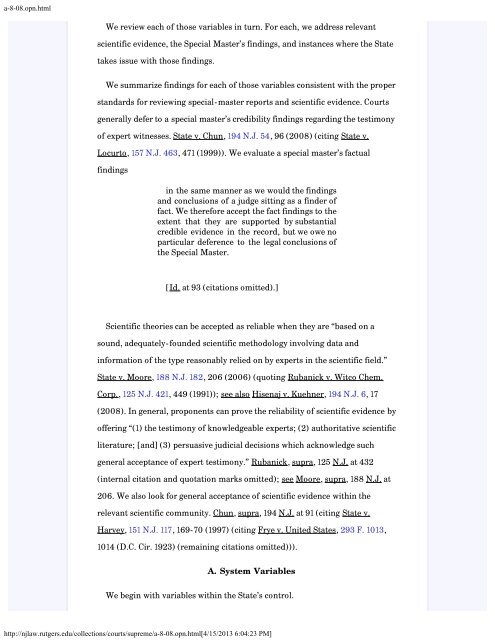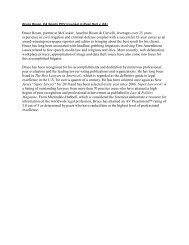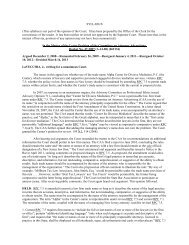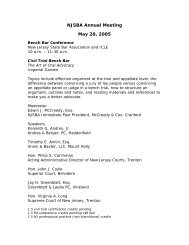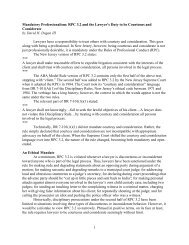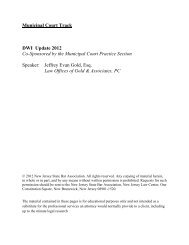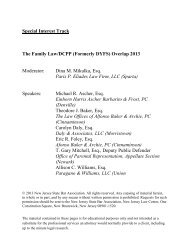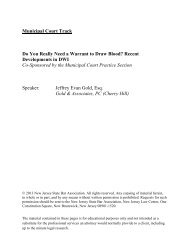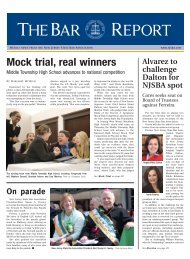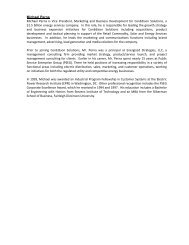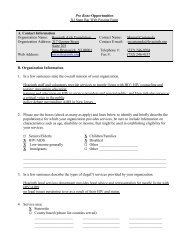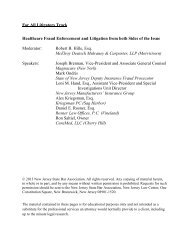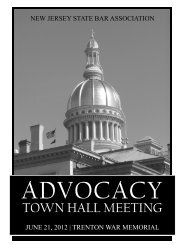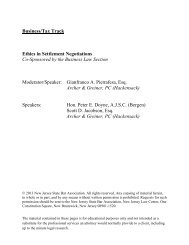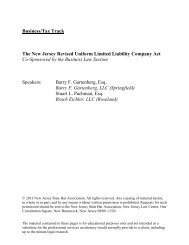State v. Henderson and the New Model Jury Charges - New Jersey ...
State v. Henderson and the New Model Jury Charges - New Jersey ...
State v. Henderson and the New Model Jury Charges - New Jersey ...
Create successful ePaper yourself
Turn your PDF publications into a flip-book with our unique Google optimized e-Paper software.
a-8-08.opn.html<br />
We review each of those variables in turn. For each, we address relevant<br />
scientific evidence, <strong>the</strong> Special Master’s findings, <strong>and</strong> instances where <strong>the</strong> <strong>State</strong><br />
takes issue with those findings.<br />
We summarize findings for each of those variables consistent with <strong>the</strong> proper<br />
st<strong>and</strong>ards for reviewing special-master reports <strong>and</strong> scientific evidence. Courts<br />
generally defer to a special master’s credibility findings regarding <strong>the</strong> testimony<br />
of expert witnesses. <strong>State</strong> v. Chun, 194 N.J. 54, 96 (2008) (citing <strong>State</strong> v.<br />
Locurto, 157 N.J. 463, 471 (1999)). We evaluate a special master’s factual<br />
findings<br />
in <strong>the</strong> same manner as we would <strong>the</strong> findings<br />
<strong>and</strong> conclusions of a judge sitting as a finder of<br />
fact. We <strong>the</strong>refore accept <strong>the</strong> fact findings to <strong>the</strong><br />
extent that <strong>the</strong>y are supported by substantial<br />
credible evidence in <strong>the</strong> record, but we owe no<br />
particular deference to <strong>the</strong> legal conclusions of<br />
<strong>the</strong> Special Master.<br />
[Id. at 93 (citations omitted).]<br />
Scientific <strong>the</strong>ories can be accepted as reliable when <strong>the</strong>y are “based on a<br />
sound, adequately-founded scientific methodology involving data <strong>and</strong><br />
information of <strong>the</strong> type reasonably relied on by experts in <strong>the</strong> scientific field.”<br />
<strong>State</strong> v. Moore, 188 N.J. 182, 206 (2006) (quoting Rubanick v. Witco Chem.<br />
Corp., 125 N.J. 421, 449 (1991)); see also Hisenaj v. Kuehner, 194 N.J. 6, 17<br />
(2008). In general, proponents can prove <strong>the</strong> reliability of scientific evidence by<br />
offering “(1) <strong>the</strong> testimony of knowledgeable experts; (2) authoritative scientific<br />
literature; [<strong>and</strong>] (3) persuasive judicial decisions which acknowledge such<br />
general acceptance of expert testimony.” Rubanick, supra, 125 N.J. at 432<br />
(internal citation <strong>and</strong> quotation marks omitted); see Moore, supra, 188 N.J. at<br />
206. We also look for general acceptance of scientific evidence within <strong>the</strong><br />
relevant scientific community. Chun, supra, 194 N.J. at 91 (citing <strong>State</strong> v.<br />
Harvey, 151 N.J. 117, 169-70 (1997) (citing Frye v. United <strong>State</strong>s, 293 F. 1013,<br />
1014 (D.C. Cir. 1923) (remaining citations omitted))).<br />
A. System Variables<br />
We begin with variables within <strong>the</strong> <strong>State</strong>’s control.<br />
http://njlaw.rutgers.edu/collections/courts/supreme/a-8-08.opn.html[4/15/2013 6:04:23 PM]


